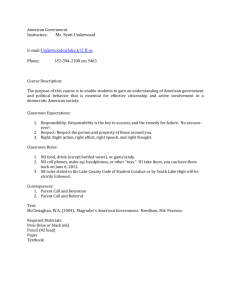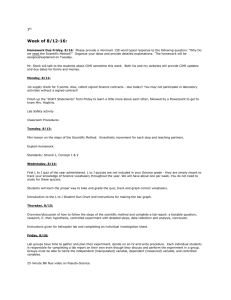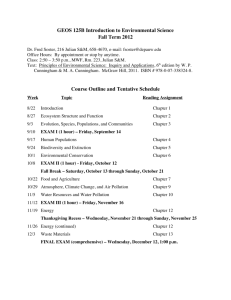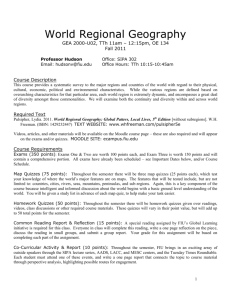Absences, Make-Up - Florida International University
advertisement
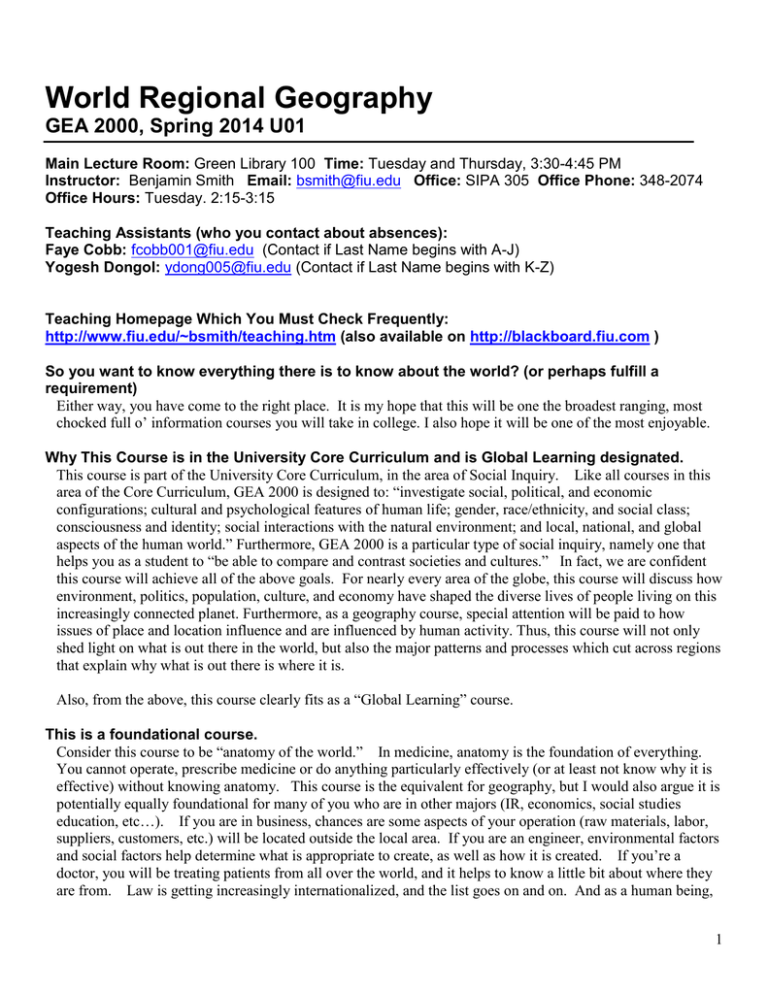
World Regional Geography GEA 2000, Spring 2014 U01 Main Lecture Room: Green Library 100 Time: Tuesday and Thursday, 3:30-4:45 PM Instructor: Benjamin Smith Email: bsmith@fiu.edu Office: SIPA 305 Office Phone: 348-2074 Office Hours: Tuesday. 2:15-3:15 Teaching Assistants (who you contact about absences): Faye Cobb: fcobb001@fiu.edu (Contact if Last Name begins with A-J) Yogesh Dongol: ydong005@fiu.edu (Contact if Last Name begins with K-Z) Teaching Homepage Which You Must Check Frequently: http://www.fiu.edu/~bsmith/teaching.htm (also available on http://blackboard.fiu.com ) So you want to know everything there is to know about the world? (or perhaps fulfill a requirement) Either way, you have come to the right place. It is my hope that this will be one the broadest ranging, most chocked full o’ information courses you will take in college. I also hope it will be one of the most enjoyable. Why This Course is in the University Core Curriculum and is Global Learning designated. This course is part of the University Core Curriculum, in the area of Social Inquiry. Like all courses in this area of the Core Curriculum, GEA 2000 is designed to: “investigate social, political, and economic configurations; cultural and psychological features of human life; gender, race/ethnicity, and social class; consciousness and identity; social interactions with the natural environment; and local, national, and global aspects of the human world.” Furthermore, GEA 2000 is a particular type of social inquiry, namely one that helps you as a student to “be able to compare and contrast societies and cultures.” In fact, we are confident this course will achieve all of the above goals. For nearly every area of the globe, this course will discuss how environment, politics, population, culture, and economy have shaped the diverse lives of people living on this increasingly connected planet. Furthermore, as a geography course, special attention will be paid to how issues of place and location influence and are influenced by human activity. Thus, this course will not only shed light on what is out there in the world, but also the major patterns and processes which cut across regions that explain why what is out there is where it is. Also, from the above, this course clearly fits as a “Global Learning” course. This is a foundational course. Consider this course to be “anatomy of the world.” In medicine, anatomy is the foundation of everything. You cannot operate, prescribe medicine or do anything particularly effectively (or at least not know why it is effective) without knowing anatomy. This course is the equivalent for geography, but I would also argue it is potentially equally foundational for many of you who are in other majors (IR, economics, social studies education, etc…). If you are in business, chances are some aspects of your operation (raw materials, labor, suppliers, customers, etc.) will be located outside the local area. If you are an engineer, environmental factors and social factors help determine what is appropriate to create, as well as how it is created. If you’re a doctor, you will be treating patients from all over the world, and it helps to know a little bit about where they are from. Law is getting increasingly internationalized, and the list goes on and on. And as a human being, 1 who has respect for other human beings, it is important to know what the rest of planet is like. Gaining basic knowledge about the world and how it works is the first step to becoming a good citizen of the world. This means there will be a lot of information and ideas presented in this course, but I think it will be information that will in someway be useful, or at least enlightening, for you. Thus you must come prepared to class, and be prepared to learn. Global Learning & UCC Societies and Identities Learning Outcomes 1. Gain an understanding of the world’s human and physical geography. This includes countries, economic activities, international institutions, environmental cycles, cultural complexes, etc. At the most basic level, before you can talk about what connects different parts of the globe, you need to be aware of what the different parts of the globe are. Thus being able to identify major human and environmental features and processes will be a part of the course. But more than that, knowing at least of little bit about the historical geography of major facets of our world provides a base on which to learn more. Like a doctor needs to know anatomy to be able to practice, as a future professional in – and citizen of – the world, this grounded knowledge is a foundation upon which further growth and learning can be built. (Global Awareness) 2. Understand major processes that shape the world. Very little of what happens on Earth happens in isolation. Large processes – such as trade, religion, environmental degradation and migration – cut across countries, regions, and hemispheres. At the same time, it is important to understand that these processes always take place in specific on-the-ground circumstances. Thus, it is not enough to know what is out there; it is equally important to understand, develop multiple perspectives on, and be able to articulate how things relate to each other (or sometimes do not). (Global Awareness) 3. Critically examine the world from multiple perspectives. This course is not about adopting any one particular perspective on the world. What this is about is realizing that there are multiple perspectives about many of the world’s big and little issues – even amongst those who conduct scholarly research on them –and being able to examine your and others’ assumptions about how the world works. This means tempering your own opinions with a willingness to examine other perspectives on their own terms. This geography course is an excellent vehicle for gaining multiple perspectives, since geography as a discipline draws on a wide-array of both social and physical sciences disciplines. (Global Perspectives) 4. Gain the ability to impact global processes. What will become obvious, as the course goes on, is that living in Miami places you at the center of many global processes – trade, migration, urbanization, and environmental change, just to name a few. Through discussions and participation, students will gain the ability to connect these processes, and understand how their actions – individually or collectively –impact the local and global community. (Global Engagement) Required Texts World Regional Geography (without sub-regions): Global Patterns, Local Lives, 5th Edition. By Pulsipher & Pulsipher. W.H. Freeman ISBN: 1-4292-3244-7 Important Dates Thursday, Jan. 23, Map Quiz 1 Tuesday, Feb. 4, First Exam Thursday, Feb. 27, Map Quiz 2 Tuesday, March 18, Second exam Thursday, March 27, Map Quiz 3 Tuesday, April 8 – Last Day to Submit Report on Common Readings to Drop-box on Blackboard Site Thursday, April 10, Map Quiz 4 and Discussion of Common Reading Tuesday, April 15 – Last Day to Submit Co-Curricular Activity Report to Drop-box on Blackboard Site Final Exam TBD (either Tuesday April 22 or Thursday April 24) Grading There will be 500 total points available in this class, broken down as follows: 2 50 points: Map Quizzes 75 points: Discussion Section Attendance & Participation 15 Points: Global Learning Common Reading Response 10 Points: Co Curricular Activity Report 100 points: Exam 1 100 points: Exam 2 150 points: Final Exam 500 points Total The grading scale is A = 100-93%, A- = 92.9-90%, B+ = 89.9-87%, B = 86.9-83%, B- =82.9%-80%, C+ = 79.9-77%, C = 76.9-73%, C- = 72.9-70%, D+ = 69.9-67%, D = 66.9-63%, D- = 62-60% F = 59-0%, which translates to, in points: A : 500 thru 465 points A-: 464 thru 450 points B+: 449 thru 435 points B: 434 thru 415 points B-: 414 thru 400 points C+: 399 thru 385 points C: 384 thru 365 points C-: 364 thru 350 points D+: 349 thru 335 points D: 334 thru 315 points D-: 314 thru 300 points F: 299 thru 0 points Exams Due to the large enrollment of this class, each exam will be multiple choice. Questions will be drawn from lectures, discussions, videos, etc. – basically anything covered in lecture and discussion. To aide you in your preparation, study guides will be provided on the teaching website. On the first two exams, there will be 50 multiple choice questions. The first exam will cover the Introduction, North America and Middle/South America. The second exam will cover Europe, Russia, SW Asia & North Africa, and Sub-Saharan Africa. On the final, there will be 50 multiple choice questions covering South Asia, East Asia, Southeast Asia, and Oceania. On top of that, there will be an additional section consisting of 25 multiple choice questions which will cover “trans-regional issues” we will have been discussing since the beginning of class (meaning this section is comprehensive). There will be a special study guide for this section. WHAT YOU MUST BRING TO EXAMS Because the enrollments are so large in this class, you will need to bring your FIU ID card with you to the exams. Also, please bring a pen or pencil. Map Quizzes Throughout the semester there will be four map quizzes, which test your knowledge of where the world’s stuff is on maps. The features that will be tested include, but are not limited to: countries, cities, rivers, seas, mountains, peninsulas, and sub-regions. You will be given a study list in advance of each map quiz, to help make your task easier. Map quizzes will contribute a maximum of 50 points towards your final grade. However, there will be more than 50 points of map questions offered during the semester. This means you can miss several questions on map quizzes over the course of the semester, and still receive the full 50 points. This means if you have one poor quiz, or solid, if not perfect, performance on all quizzes, then you will still receive full points. 3 Common Reading Individual Essay & Group Report A special reading assigned by FIU’s Global Learning initiative is required for this class. Everyone in class will complete this reading, write a one page reflection on the piece, discuss the reading in small groups, and submit a group report (handwritten or typed in class). Your grade for this assignment will be based on completing each part of the assignment. Instructions for this assignment will be available on the course website. Co-Curricular Activity & Report Throughout the semester, FIU brings in an exciting array of outside speakers through the SIPA lecture series, AADS, LACC, and MESC centers, and the Tuesday Times Roundtable. Each student must attend one of these events, and write a one page report that connects the topic to course material through perspective analysis, highlighting possible routes for engagement. You must submit your Report within one week of the event you attend. Instructions for this assignment will be available on the course website. Reading the Book Reading the textbook before you come to class, even quickly, will help your grade tremendously. I basically lecture from the book (with a little bit of added material of my own), and having an idea of what is coming up in lecture will allow you to more easily keep up with my pace. Reading will also make you prepared for discussion section. It’s also a repetition thing – you are more likely to remember if you see information in the book, then here it from me, then talk about it in discussion, then finally learn it through studying for the exam. Attendance At least once a week (usually, but not always, on Thursday) we will have some sort of in class activity. Sometimes, this is the map quiz; right before a test, it will be review for the exam. Other times, we will watch a short video or be given a question and break into groups to discuss and write down answers. Whatever paper is collected on the day will be used to count attendance. You get two free absences throughout the semester. For your first two absences, you do not need to contact your TA. Beyond that, you need to provide an excused absence to your TA. AGAIN, THE TA YOU CONTACT IS BASED ON THE FIRST LETTER OF YOUR LAST NAME. TA’s are the final authority on attendance and make-up matters; for questions about course content or questions about how wonderful geography is, feel free to email Prof. Smith. When at lectures, I expect you to be on time, be engaged and non-disruptive to other students (which means no use of smart or cell phones, doing homework for other classes, headphones, setting off fireworks, etc..). Those students who keep other students from learning, or who are disrespectful of other students and/or the instructor will be asked to leave that day’s lecture. I want everyone to do well, and showing up will certainly help. Absences, Make-Up Excused absences include serious illness; illness of a spouse or dependent; death of an immediate family member; University-sponsored trips; and major religious holy days. It is your responsibility to inform your TA of an absence in advance of class by e-mail (and within 2 weeks of the start of class if it is a university trip or holy day), but no later than two class sessions after the missed class. In order to have an absence excused, you must provide original documentation which your assigned TA can keep. If this is done, and the TA determines the absence to be excused, they will not figure the missed day (provided there is not a quiz or exam) into your grade. 4 Make-up exams and quizzes will only be given in extreme circumstances. There are just too many of you to make arrangements otherwise. The make-up exam or map quiz will not be the same one given to those who took the test on the established date, and will be given during the final examination period, during which time you will take both the make-up exam/quiz and the final. To sit a make-up exam, you must 1) provide documentation to your TA in class within two class periods of the missed exam/quiz addressing why your absence qualifies as excused 2) have that documentation accepted by the TA 3) email your TA asking to be given a make-up exam and 4) receive back an email from your TA confirming a make-up exam will be given. Your choices to attend or not attend have consequences – just like they would at work. The TA’s and I take our responsibilities and roles as teachers seriously; I hope you hold your role and responsibility as a student in equal respect. Teaching Website, On-Line Articles, and Updates At the top of this document, you will find the address for my teaching homepage, which is http://www.fiu.edu/~bsmith/teaching.htm . You can also always find it by Googling “Benjamin Smith Teaching.” There will be a copy of the main course syllabus, copies of all the TA section syllabi, the course schedule, exam study guides, map quiz study guides, and lecture outlines. Due to the cost of printing, none of the materials will be handed out. If you want them, you must go to the website. Links to all of this information (as well as possible exercises for discussion sections), will can also be found on http://blackboard.fiu.com . If you have trouble logging on to that website, contact UTS to help you get on board. Thus, if you have a question about the structure of the class (due dates, test structure, etc.), check the website, because the answer will probably be there. Email, Office Hours & Making Contact My office hours are posted at the top of this document. If you are having trouble at all, I strongly encourage you to stop by or call during office hours or make an appointment to do so. My job is to help you learn, not just to assign grades. If you have a question, and cannot find the answer on the website or in the book, please, if you can, hold on to it until class time – because chances are other students have it as well and answering questions is what class is for. I am happy to help answer substantive questions; however, please recognize that besides that besides teaching this class, I teach another course, several independent studies, serve on committees, conduct research and have a 5 year old at home. While I want you to learn and do your best, please remember there are only 24 hours in the day. If in doubt, check the website first – it is designed to answer most of your questions before you ask them. But again, let me repeat, above all, we want to help you succeed. If you can’t figure out the answer, please email us. Academic Integrity and Cheating: This goes without saying, but do not cheat on the exams or map quizzes. If you are caught cheating on an exam, you will receive a 0 on that exam. If you get caught cheating on a map quiz, you will get a 0 on all map quizzes. Either will do some serious damage to your grade. Disclaimer 5 This syllabus is intended to give the student guidance in what may be covered during the semester and will be followed as closely as possible. However, the professor reserves the right to modify, supplement and make changes as the course needs arise. Here’s to a good semester and best of luck! 6

